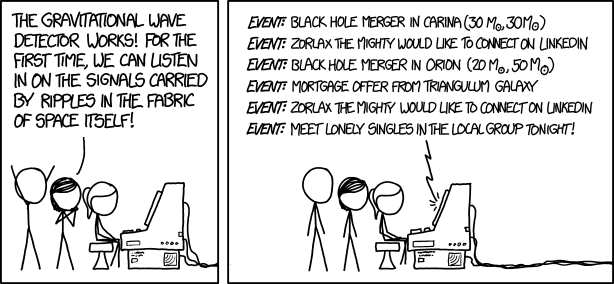They were fussing about this on Breakfast yesterday. I didn't get the sense that they had actually detected anything yet, only that they expected to.
For me the most exciting thing is we will literally be able to see the big bang. Using electromagnetic waves we cannot see further back than 400,000 years after the big bang. The early universe was opaque to light. It is not opaque to gravitational waves. It is completely transparent.
So literally, by gathering gravitational waves we will be able to see exactly what happened at the initial singularity. The most weird and wonderful prediction of Einstein’s theory was that everything came out of a single event: the big bang singularity. And we will be able to see what happened.
Yeah, right. With light or near-light, we have had sophisticated 2D imaging systems from the Mk1 eyeball through photographic emulsion to semiconductor sensors. With radio, the antenna on a steerable dish or horn (effectively a single pixel) can be scanned across a region to build up an image in the form of an intensity map. Even X-rays can be imaged, albeit with difficulty. What have you got with a gravitational wave detector? Not much more than putting a tin can on top of a wall, waiting for an earthquake to dislodge it, and saying "there's one!".
Okay, by detailed analysis of the differential v. time between the arms of the interferometer it may be possible to work out the strength and what direction the gravitational wave was propagating in, +/- 180 deg, in the plane of the arms, but that's it! Maybe they could use aperture synthesis, like connected arrays of radio telescopes, but radio is easy - I can't imagine what an aperture synthesis array of gravitational wave detectors would be like, given that one detector is 4km in two perpendicular directions!
The best they can do, as far as I can see, is calculate from whatever theory they are trying to test, what a gravitational wave detector should output if the theory is correct, and if that's what they see it is another data point supporting (or disproving) that particular theory. It ain't gonna show you a picture of the big bang any time soon!
That's assuming they really have detected gravitational waves and not the cosmic ether (which is what Michelson & Morley were trying to find with the first interferometer).
And isn't it rather suspicious that there were a pair of black holes (what? another one??) spiralling to destruction just when they turned the detector on?


